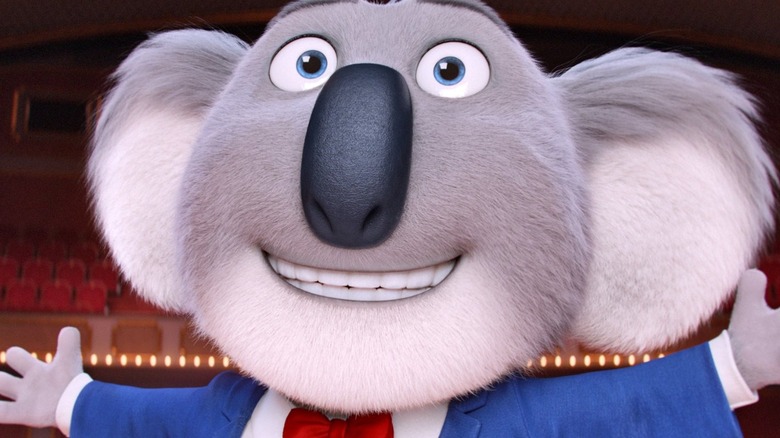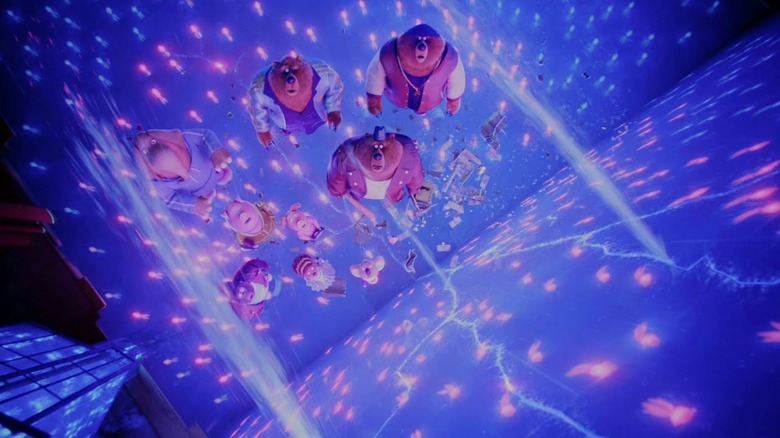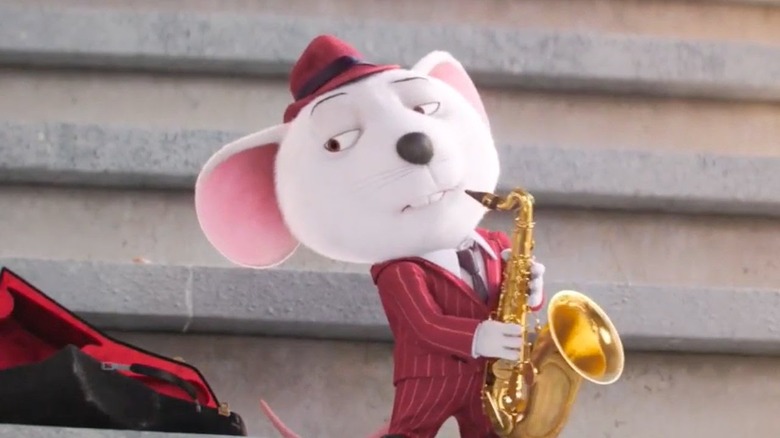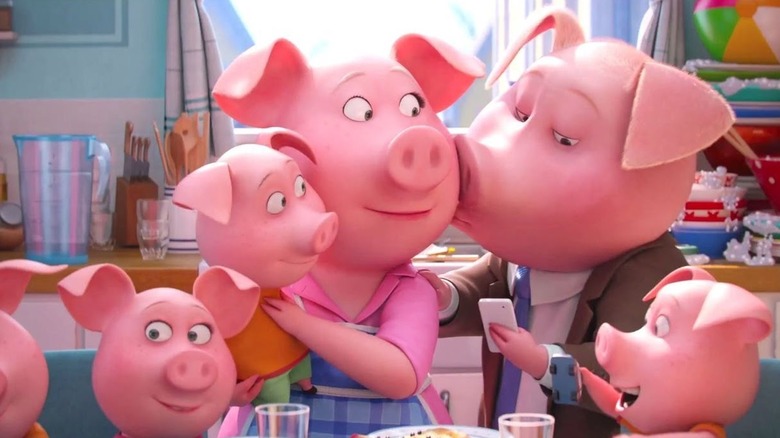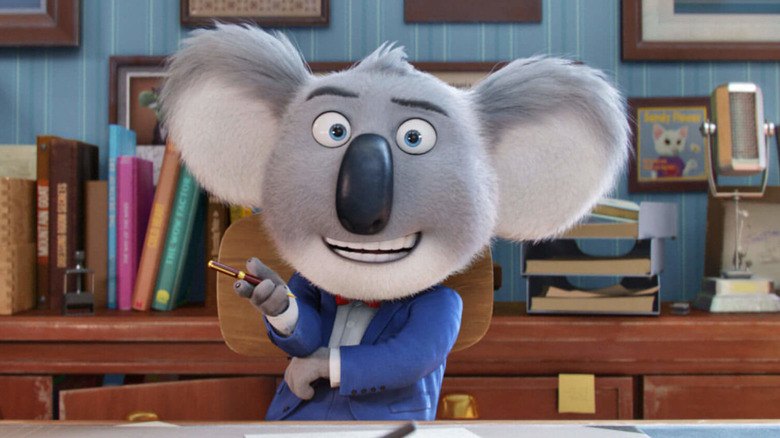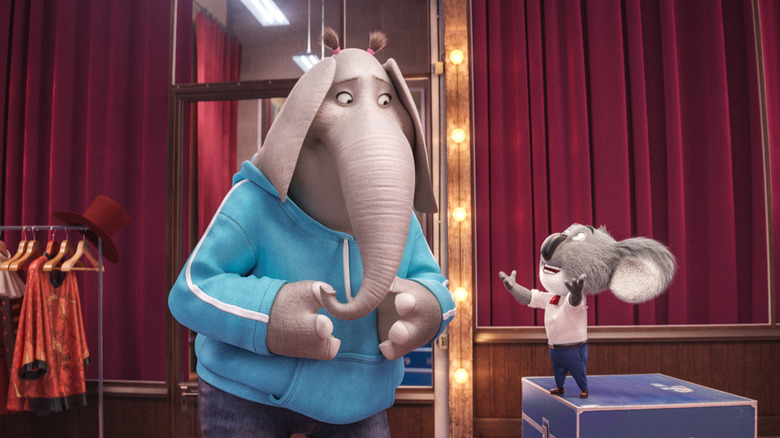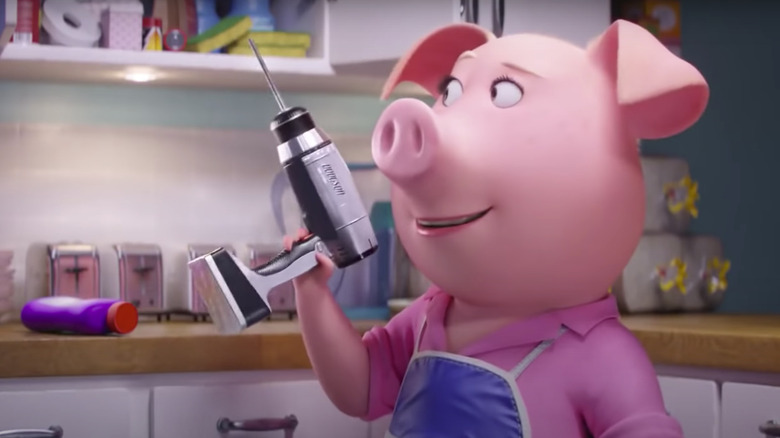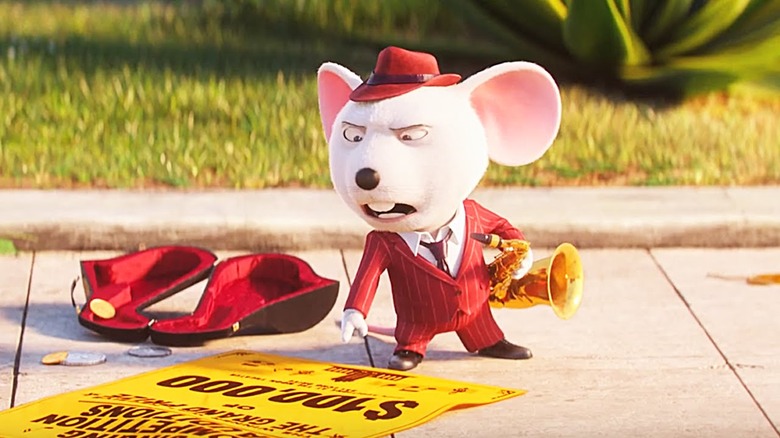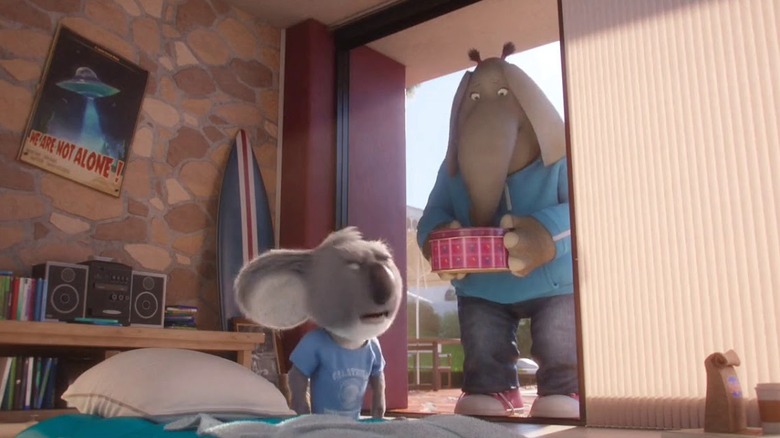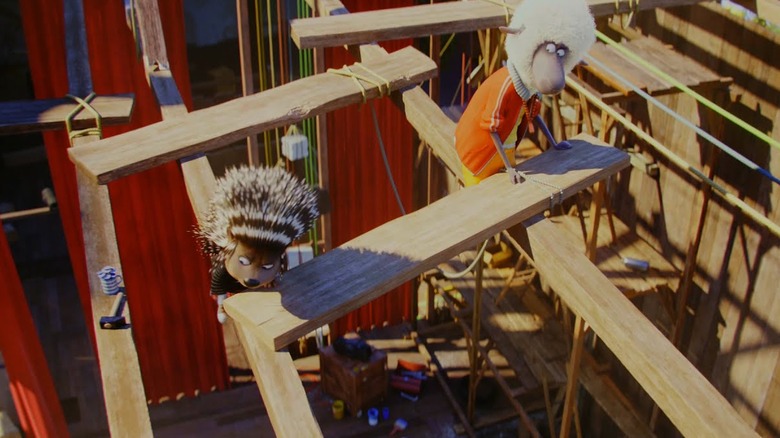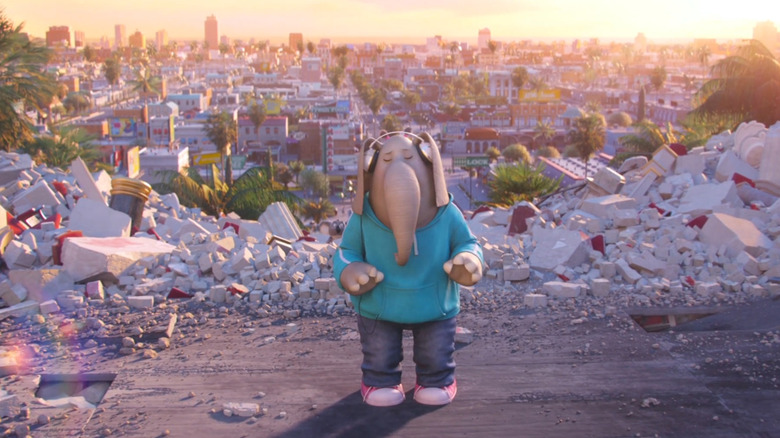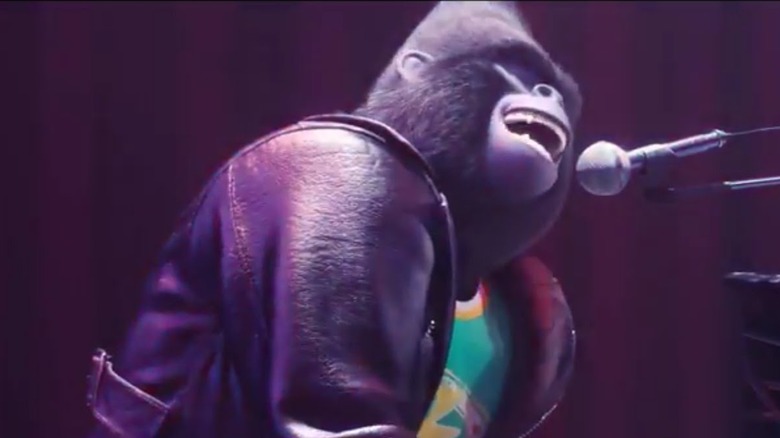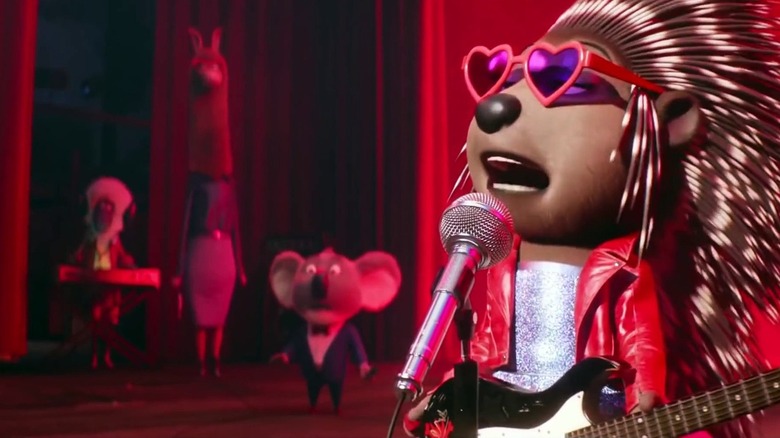Things Only Adults Notice In Sing
Featuring a star-studded voice cast and stuffed to the bursting point with catchy pop hits sung by adorable animals, the 2016 animated family film "Sing" has plenty for both kids and their accompanying grown-ups to enjoy. "Sing" follows a down-on-his-luck koala named Buster Moon (Matthew McConaughey), who decides to stage a small singing competition in a last-ditch effort to save his struggling theater. However, thanks to a costly typo, interest in the competition skyrockets, bringing all sorts of attention — of both the wanted and unwanted varieties — to Buster's Moon Theater.
The "American Idol" meets "Zootopia" premise of the film is easy for kids to follow, even if some of the film's subtleties may fly over their heads. That said, adults in the audience may pick up on some aspects of "Sing," both intentional and inadvertent, that probably require a few more years of life experience to catch. From dire domestic situations to winks at other pieces of pop culture, here are some of the things that only adults notice in "Sing."
Classic movie nods
Although "Sing" is a movie for children, it features a number of nods to various other pieces of pop culture that aren't really intended for the elementary school crowd. For example, in an early scene, Buster leaves his office by crawling through a secret tunnel that he's hidden behind a piece of artwork in his office. This is very similar to how Andy Dufresne (Tim Robbins) executes his famous escape from prison in "The Shawshank Redemption," in which he hides a secret tunnel behind a poster on his cell wall, indicating to adult viewers that Buster feels trapped in his situation.
Later, when the Moon Theater floods after Buster's disastrous attempt to use squids to provide the lighting for his show, the sequence of the theater filling up with water is reminiscent of the ballroom flooding in "The Poseidon Adventure." That film follows a luxury liner on its final voyage, which winds up belly-up after being flipped by a tsunami, drawing a parallel to how the Moon Theater's last show seems doomed to end in disaster. Finally, when gorilla Johnny's (Taron Egerton) father escapes from prison and flees from police over the rooftops, the sequence feels very similar to the climax of "King Kong." This is perhaps an indication that the whole high-adrenaline sequence is not motivated by malice or fear but ultimately by love.
The Mouse Pack
While most of the songs performed by the various characters in "Sing" are contemporary pop and rock hits, miniature crooner Mike (Seth MacFarlane) favors more classic numbers. We initially meet Mike — a mouse — performing The Dave Brubeck Quartet's jazz standard "Take Five" on his saxophone, but when it comes time for him to sing, he exclusively prefers songs previously performed by Ol' Blue Eyes himself, Frank Sinatra.
Mike's songs include "Let's Face the Music and Dance," "The Girl from Ipanema," "Pennies from Heaven," and, of course, "My Way," all of which were once recorded by Sinatra. Not only does this easily convey how Mike sees himself — as a charming and iconic artist — but it also contains an amusing pun for adults familiar with Sinatra. Along with a handful of other performers, including Dean Martin and Sammy Davis Jr., Sinatra was a member of a group known as the Rat Pack in the 1960s. Since Mike is a mouse, having him mimic a member of the Rat Pack while covering Sinatra's famous songs may be another indication that he's a bit out of his depth, despite his confidence that he's a star.
Rosita and Norman could use some couples therapy
Porcine homemaker Rosita (Reese Witherspoon) begins "Sing" yearning for a bit of excitement outside of her day-to-day existence as the perfect housewife to her husband Norman (Nick Offerman) and supermom to their 25 children. While Rosita loves her family and takes pride in keeping the perfect home, she can't help but wish for something more that's hers alone. Her opportunity comes when she finds out about the singing competition, but it requires her to take a couple of days to herself, away from the kids.
At first, Rosita tries to ask Norman if he can watch the kids while she's gone, but he can't even stay awake long enough for her to get through her question. Instead, she creates a complex machine that will take care of her kids and her husband. The next day, Norman is so disconnected that he doesn't even notice that his wife has been replaced by a machine and a tape recorder. It takes until the machine malfunctions for Norman to realize Rosita isn't around.
Although Norman does show up at the show to support his wife, it doesn't seem like a great sign that Norman is so unplugged that it took him days to notice she was gone in the first place. Hopefully, now that Rosita has figured out how to take some time away from the kids, Norman and Rosita can carve out a couple of hours a week to visit a marriage counselor.
Buster is actually really bad at his job
The whole premise of "Sing" centers around Buster's attempts to save his beloved theater, and audiences are expected to cheer him on based mostly on Buster's own nostalgia — and the fact that he's an adorable koala. However, the reality is that the Moon Theater's gradual decline isn't much of a shock, considering that Buster isn't a particularly great theater manager. Right off the bat, we learn that Buster hasn't been paying his stage crew, seemingly because he is out of money after burning through all of his lines of credit and then failing to pay back his creditors.
As "Sing" progresses, we see one after another of Buster's decisions turn out to be ill-conceived at best and disastrous at worst. From assigning performers songs that don't fit their performance style to designing an aquarium stage that can't handle the weight of multiple animals simultaneously, Buster's production instincts leave quite a bit to be desired. It's probably for the best that the theater winds up getting purchased by someone else at the end of the film, following the successful show. Left to his own devices, Buster may have wound up driving the Moon Theater straight back into the ground again.
For someone who is broke, Buster sure spends a lot of money
When Buster comes up with the idea for the singing competition, he is a few bucks shy of the $1,000 he wants to offer up as prize money, so he tosses a few personal items into the prize treasure chest to even things out. That is presented as the very last of the Moon Theater's assets, which begs the question of how exactly Buster funds the show he's putting on. From coordinated costumes and custom sets to an entire theater stage renovation, Buster signs off on quite a few choices that would likely not be free, or even cheap.
Where he's getting the money from is never clear. We know that Buster has been cut off from his creditors, has no savings, and although his best friend Eddie (John C. Reilly) is well connected, he never appears to be funding the show. It's possible the performers could be putting up cash, but considering how desperately they all want the (nonexistent) prize money, it doesn't seem likely that they'd be shelling out that much just for the opportunity to compete for the prize. Plus, since no one knows how dire Buster's financial situation is, it doesn't feel probable that he'd be openly asking for money.
So how is Buster funding his show? Kids likely won't think to ask, but adults have lived long enough to know that none of what he's doing is free and to wonder where the money is coming from.
Rosita should be the breadwinner in her family
We never learn what Rosita's husband Norman does for a living, only that it's so time-consuming and exhausting that he comes home from work with no time or energy left for his family. He must make a pretty decent living to provide for a family of 27, but while their family seems comfortable, they're hardly living in the lap of luxury. However, while no one ever questions that Norman is the breadwinner in their family, "Sing" seems to make a strong case for him staying home and letting Rosita take a swing at the role.
In one night, Rosita constructs a series of complex machines that wake her children up, feed them breakfast, clean up after them, give them their lunches and get them out the door to school. After that, these incredible devices lock up once her children come home, put them to bed at night (complete with a bedtime story), and even remind her husband where he put his car keys. And that's all just with tools and supplies she already had at home.
If that's what Rosita is capable of in eight hours with zero budget, just think of what she could accomplish with some actual funding and time to innovate. It seems like the wrong pig may be bringing home the proverbial bacon.
Mike's attempted theft gets completely overlooked
While the audience of "Sing" knows from the get-go that Buster's treasure box of prize money only contains a little under $1,000 in actual cash, all of the other animals in the film (save his assistant, Miss Crawly) are operating under the impression that it contains $100,000. So when Mike gets on the wrong side of a mob of bears, since he owes a debt he is unable to repay and then makes things worse by cheating at cards, the first thing he thinks of to pay his debt is, naturally, the prize money.
Of course, once the bears break open the chest, they realize that the sum inside was significantly less than Buster promised. At that point, everyone turns on Buster, understandably upset that he lied to them all. However, what goes overlooked in the scene is that Mike blatantly tried to steal the prize money just a few minutes before. If there had really been $100,000 in that chest, Mike was prepared to steal it from Buster and his co-competitors and turn it over to the bears. That Buster lied about the sum inside doesn't feel like it should completely wipe out Mike's treachery, but that's exactly what happens. Kids may be quick to forgive, but adults will realize that Mike got off way too easy.
All the wrong people apologize to each other
After the Moon Theater is destroyed, thanks to the shattered squid tank flooding the theater, Buster gives up and goes to his friend Eddie's house, wallowing in depression. But while he's there, most of the contestants take turns dropping by to try to cheer him up and convince him to move forward with the show. He rebuffs their efforts, insisting that he is a failure and the show will never work, until he winds up changing his mind after hearing the shy Meena the elephant (Tori Kelly) sing.
Kids will likely view this sequence as a typical scene about trying to cheer up a friend who has suffered a setback, but adults will inevitably question why the contestants are the ones doing all the apologizing in this scene. After all, Buster is the one who lied (even if it was inadvertent) to get them to participate in his show in the first place. Beyond that, Mike, the only one who owes Buster an apology for trying to steal the money, never even bothers to show up. We understand that Buster feels bad about losing his theater, but it still seems a bit much to have him rejecting apologies from the very individuals he wronged the most.
Who paid to rebuild the theater?
For a movie centered almost entirely around the literal high cost of show business, "Sing" sure does play fast and loose with how much it costs to actually put on a show. Considering that Buster does not have the money to stage the show he is initially planning in his working theater, he definitely shouldn't have the money left to rebuild it, even partway, after it's destroyed. If some sort of natural disaster had damaged the Moon Theater, it's possible that insurance could have covered the cost of partially rebuilding the theater. However, the tank explosion was caused almost entirely by Buster's negligence. He was even the one who made the initial crack that led to its explosion.
Insurance companies aren't typically in the habit of paying to rebuild structures that their owners destroyed through their own actions, and Buster was already flat broke before the theater collapsed. Yet, somehow, Buster and his ambitious performers can afford lumber, lights, and new sets to get the theater functional again, even if it doesn't have exterior walls. It's not the full cost of rebuilding an entire theater, but it's definitely more than the zero dollars Buster has to his name.
Hallelujah is an awkward song choice for a kids' movie
"Sing" doesn't skimp on the recognizable tunes, and one of its biggest moments comes when Meena belts Leonard Cohen's "Hallelujah" from atop the wreckage of the Moon Theater. Buster is so moved when he hears her that he reconsiders trying to stage the show and decides on the spot to give it another shot. It's a moving scene, and "Hallelujah" is irrefutably a powerful song, but it's still an odd choice for the climax of a kids' movie.
Adults will likely be aware that "Hallelujah" has been covered by numerous artists since its original release by Cohen in 1984. One of the most well-known versions of the song is the cover by Jeff Buckley, who once referred to the song as "a hallelujah to the orgasm," according to Rolling Stone. Other artists have also interpreted "Hallelujah" as having sexual undertones, with plenty of writers opining that the song is actually explicitly sexual.
While kids are not likely to read into the lyrics of the song too much, adults may wonder why "Sing" picked a song that many believe to be about sexual pleasure to score a scene in which an adult male koala sneakily listens to a shy young female elephant sing her heart out.
Johnny is the Rocketman
Although the song we see Johnny rehearsing for the final show is John Legend's "All of Me," once the curtain finally rises, he goes with a different tune, performing a rousing rendition of Elton John's "I'm Still Standing." His energetic performance is enough to grab the attention of his father from inside his prison cell and inspires him to break out and get to the theater so that he can see Johnny perform in person. Kids will no doubt be bouncing in their seats to the upbeat tune, even if they're not familiar with John as a performer.
However, adults watching may make the connection that Taron Egerton, the voice actor for Johnny, would go on to play Elton John himself in the 2019 biopic "Rocketman," in which he'd perform "I'm Still Standing" yet again. In "Rocketman's" version, Egerton would actually recreate John's original music video for the song, while in "Sing," Johnny simply played the piano on stage. Obviously, when Egerton voiced Johnny in "Sing," no one knew that he would later wind up playing Elton John himself, but one has to wonder if his performance as the musically gifted gorilla helped him snag the role.
Being in that audience should come with a liability waiver
Imagine buying a ticket to a talent show, only to have spikes intermittently flung at your face. That's essentially what happens to the patrons of the show at the end of "Sing" (although it's a bit fuzzy whether they had to buy their tickets or not). When teenage porcupine Ash (Scarlett Johansson) performs her original song "Set It All Free" during the show, her enthusiastic spinning and headbanging sends the quills flying from her head, many of them heading into the audience. Although the audience responds with wild applause and cheers, it's hard to miss that numerous characters have been impaled by her quills, which are naturally difficult to remove and typically require professional attention thanks to their barbed structure.
Any actual theater owner would likely be sweating buckets if numerous patrons wound up being injured during their show, especially if their wounds required a trip to the hospital to treat. Buster is already broke and may not have the liability insurance that would cover injuries caused by one of his performers. Fortunately for him, no one who was hit by Ash's quills seems particularly litigious, but adults will realize that Buster dodged a bullet when no one held him accountable for his failure to look out for the safety of the audience.
